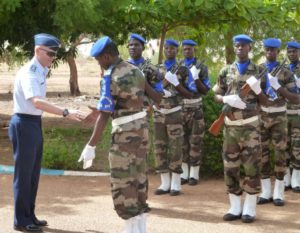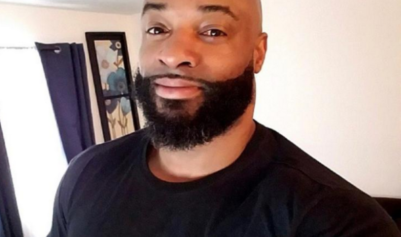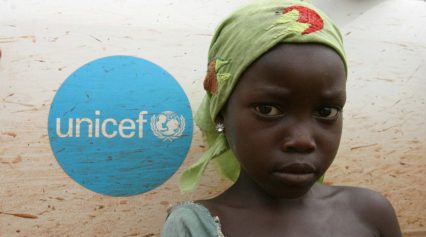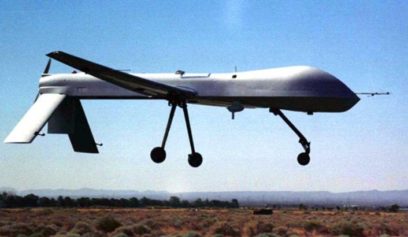
Members of the Nigerien Air Force greet U.S. Air Force Maj. Gen. Carlton D. Everhart II, 3rd Air Force vice commander, during a pass and review ceremony on his visit to Base Aerienne 101 in Niamey, Niger, April 29, 2013. Everhart visited with Nigerien senior military leaders and airmen to exchange techniques and ideas on strengthening partnership capacities between the two air forces. (U.S. Air Force photo by Capt. Reba Good/Released)
The death of Sgt. La David Johnson and three other Green Berets in Niger, and Trump’s insistence to Johnson’s pregnant widow that “he knew what he signed up for” begs the question: What are the United States and Western Europe doing in Niger?
On a macro level, as China has ramped up its economic footprint in Africa with trade and investment, the United States has been increasing its military involvement on the continent. AFRICOM, the Pentagon’s military presence on the continent formerly known as the United States Africa Command, identifies its “core mission of assisting African states and regional organizations to strengthen their defense capabilities better enables Africans to address their security threats and reduces threats to U.S. interests.” AFRICOM now maintains 46 U.S. military bases in 24 African countries, with a dramatic rise in American commandos in the continent — 17 percent of U.S. special forces overseas — a U.S. presence of elite soldiers second only to the Middle East region. Currently, 800 U.S. troops are stationed in Niger.
Although Africa is of strategic importance to the United States due to the continent’s vast oil, natural gas and mineral reserves, terrorism is the reason AFRICOM has stated for its involvement in the region. More specifically, however, Army Green Berets are in Niger as part of a counterterrorism mission to train Niger’s military to fight Islamic militants in neighboring countries such as Mali. They arrived in 2013 to assist the French military, which intervened in neighboring Mali the prior year after an Al Qaeda affiliate took control of the northern region of the country and was headed toward the capital city of Bamako. At that time, President Obama sent 150 troops to establish a drone operation based in the Nigerien capital Niamey.
As Democracy Now! reported, Trump has given AFRICOM much leeway in going throughout the African continent and tracking down militant groups. The American special forces were embedded with Nigerien troops and conducting an operation in a remote western part of Niger. They were ambushed, and four were killed. “I was surprised that there were so many Americans surprised about the U.S. presence in West Africa. That’s something we’ve been expanding for some time,” Amanda Sperber, a journalist based in Nairobi, Kenya, and Mogadishu, Somalia told Democracy Now!. “We have a drone base set up in Niger, as well. And the American presence on the continent, in general, is wildly underreported and misunderstood.”
However, there has been far more U.S. attention paid to the killing of the four American soldiers than the October 14 dual truck bombings in Mogadishu, killing more than 300 and injuring hundreds in what is now called the “Mogadishu massacre” and “the 9/11 of the Somali people.” The terrorist attack came after Trump escalated a campaign against the terror group al-Shabab in Somalia. The U.S. and the European Union spend $1.5 billion each year to support AMISOM, the African Union force in Somalia, according to Somali scholar Abdi Samatar. Samatar told Democracy Now! that the international community is not serious about helping the Somali people and nurturing democracy and peace, but rather about containing the problem.
“If they were to spend a quarter of that sum of money on developing a Somali security force that’s mobile, that it can engage in guerrilla tactics and go after al-Shabab, this kind of a carnage would have been easily sort of avoided, and the people would have been saved,” he said.
Although investigations are underway by American officials and there are unanswered questions, with members of Congress demanding answers, there are reports that Trump’s reluctance to discuss the deaths of the Green Berets in Niger could be a product of misguided U.S. foreign policy, specifically Trump’s inexplicable decision to add Chad to his travel ban. As Rachel Maddow reported on MSNBC, events in Niger might have caused this president to divert attention from the circumstances surrounding the deaths of the soldiers.
Maddow has received criticism for her theory, which suggests the Trump White House has destabilized Niger and the surrounding region when Trump, seemingly at random, added Chad to its travel ban, despite warnings from foreign policy experts, the State Department and the Pentagon that doing so would bring instability to the area and place Americans in jeopardy.
The Guardian reported that Chad was added to the ban on September 24 because the Trump administration requested that all countries provide a passport sample to demonstrate it was counterfeit-prooff. Chad could not comply because it ran out of its forgery-proof paper and the United States refused to accept a recent passport sample. The decision to add Chad to the ban was confounding, considering Chad was an ally cooperating with the U.S. on counterterrorism. A week later, Chad withdrew its troops that were fighting Boko Haram in Niger. Boko Haram fighters immediately moved into Niger, causing local people to flee.
More evidence that U.S. involvement in Africa has everything to do with natural resources is the fact that in 2016, Exxon Mobil Corp. — the world’s largest oil company — was ordered by Chadian courts to pay $74 billion to Chad for underpayment of royalties, then reached a settlement with the nation to avoid the fine. The corporation has been drilling in the central African nation for 15 years. U.S. Secretary of State Rex Tillerson was the chairman and CEO of Exxon Mobil, fueling speculation that the Trump administration adding Chad to the ban was an example of punishment against Chad in retaliation for demanding the fine from the petroleum giant.
The West built wealth from the exploitation of Africa. The history of the U.S. in Africa has been one of economic exploitation, assassinating leaders and engaging in regime change, and maintaining “friendly” governments that support American interests. American corporations and Big Oil continue the plunder of the continent. Fela Kuti summed up the state of affairs in his song “International Thief Thief.”
Many foreign companies dey Africa carry all our money go
Many foreign companies dey Africa carry all our money go
Them go write big English for newspaper, dabaru we Africans
Them go write big English for newspaper, dabaru we Africans…Them go dey cause confusion (Confusion!)
Cause corruption (Corruption!)
Cause oppression (Oppression!)
Cause inflation (Inflation!)Oppression, oppression, inflation
Corruption, oppression, inflationThem get one style wey them dey use
Them go pick one African man
A man with low mentality
Them go give am million naira breads
To become of high position here
Him go bribe some thousand naira bread
To become one useless chief


